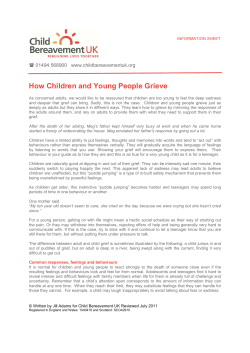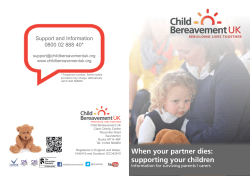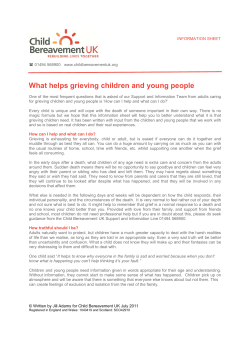
When a Grandparent Dies: the impact on children and young people
INFORMATION SHEET 01494 568900 www.childbereavementuk.org When a Grandparent Dies: the impact on children and young people Parents have a great deal to manage when their own parent or carer dies. There is the grief associated with their own loss but also the reactions and responses of their children to the death of a grandparent. The death of a grandparent is often a child or young person’s first encounter with the loss of someone important as the result of a death. Dependant on their life experiences so far, the realisation that we die may come with varying degrees of surprise, even shock. They probably have had an awareness at some level, but until directly affected may not be prepared for the reality. Some children will work out that if a grandparent has died, other people may die, resulting in unusually clingy or anxious behaviour. Others may take it all very much in their stride. Children look to the adults around them for cues on how to react and respond, so this first encounter with loss and grief is an important life lesson. It will influence and shape how these children respond in the future; whether they feel it is OK to talk about death and dying and to show their emotions, or perceive it as something better ignored and swept under the carpet. The media tends to present a rather skewed version of death and dying, concentrating on the dramatic and traumatic. This can result in some children, not just those who are younger, being rather anxious, viewing dying as something fearful. It might help to reassure your children if you explain that just like being born, dying is a part of the life cycle and that it is a natural and inevitable result of growing older. Yes we are very sad and will miss Granny a lot, but it might help you to remember that we have lots of memories of her. Can you remember when.. Others may be a bit more prepared having had a family pet or someone else that they know die. These previous experiences will hopefully have familiarised them with some of the behaviours and feelings associated with a death and the rituals we use to say goodbye. If your children understand that you are upset or behaving differently because their grandparent has died, your distress will be of less concern to them. Explaining that to react like this is perfectly natural gives your children “permission” to show their own sadness, should they need to. Equally, remind them that we are all different and if they don’t have the same response as you, or other family members, that is OK too. The closeness of the relationship and frequency of contact that grandchildren have had with their grandparents will influence their response. The death of a distant grandparent with whom they have had little contact may be an event that causes little upset and any grief is short lived. However, children can sometimes be taken unawares. Initially unaffected, the full significance of the loss may not be realised until attending a family occasion such as a wedding. They are now aware that someone important is missing, and always will be. Young people can sometimes not appreciate the special things that grandparents can bring until that grandparent is not around. Gone also is the potential to put right any regrets that a grandchild may have as regards their relationship with their grandparent. Negative feelings associated with this can sometimes be helped by writing a letter to express what they wished they had said when the grandparent was around. As a consequence, the relationship the child has with any grandparents still alive may take on a new, more positive, meaning. Author: Jill Adams June 2012 Review: August 2013 Version No: 01 © Child Bereavement UK Registered in England and Wales: 1040419 and Scotland: SCO42910 In today’s world, many grandparents have a key role to play in a child’s life providing childcare for working parents and seeing their grandchildren on a regular basis. Others are their grandchild’s main carer, responsible for the child’s upbringing. Clearly, the closer relationship, the more keenly the loss will be felt and for a significant number of children and young people today, it can feel like losing a parent. Steven was eight years old when his much loved grandmother died. He went in and out of the hospital room several times before saying goodbye. He left a small picture of himself on her pillow to “take with her”. Adolescents and teenagers often have a stormy relationship with parents and carers and therefore appreciate non-judgemental support and unconditional love from grandparents. Modern communication methods such as SKYPE mean that even when geographically distant, a close bond can be formed by a child with a family member who can offer a different view of the world from that of a parent. The loss of this special relationship can be deeply felt. When a grandparent dies, it is an opportuntity for a family to grieve together, but at the same time recognising that each had their own unique and individual relationship with that grandparent, and will therefore experience the loss in their own way. The death is an opportunity for children to learn that they can handle sad things in life and therefore acquire increased confidence and strengthened resilience for whatever life might throw at them, a powerful legacy for any grandparent to leave. Should you wish further information or guidance, please do not hesitate to contact the Child Bereavement UK Support and Information Line 01494 568900. Other information sheets on our website you may wish to read: How Children and Young People Grieve What Helps Grieving Children and Young People Explaining To Young Children That Someone Has Died Explaining Funerals, Burial and Cremation to Children Suggestions of resources that may be helpful Dear Grandma Bunny by Dick Bruna Cost £3.99 Miffy’s Grandma died last night and Grandpa Bunny is crying. Using Miffy’s experiences, this simple story would help an adult to explain to a very young child why people are sad when someone dies and what happens at a funeral. It includes a basic illustration of a coffin. Suitable for around age 3 upwards. Badgers Parting Gifts by Susan Varley Cost £4.99 When old Badger dies, his friends think that they will be sad forever. Gradually they are able to remember him with joy and gratitude and to treasure the gifts he left behind for each one of them. Primary school age. Granpa by John Burningham Cost 5.99 Granpa nurses his grandaughter’s dolls, eats her pretend ice cream and takes her tobogganing. A poignant tale of friendship and loss. Primary school age. Author: Jill Adams June 2012 Review: August 2013 Version No: 01 © Child Bereavement UK Registered in England and Wales: 1040419 and Scotland: SCO42910
© Copyright 2025





















